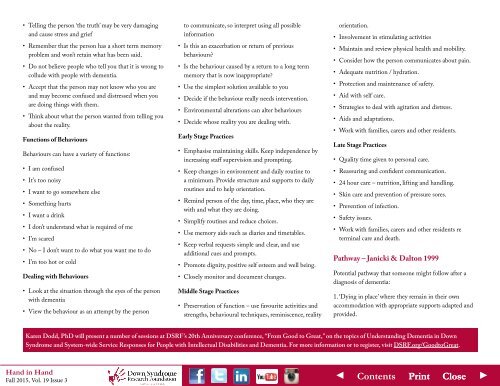Hand in Hand
HIH19-3
HIH19-3
- No tags were found...
Create successful ePaper yourself
Turn your PDF publications into a flip-book with our unique Google optimized e-Paper software.
• Tell<strong>in</strong>g the person ‘the truth’ may be very damag<strong>in</strong>g<br />
and cause stress and grief<br />
• Remember that the person has a short term memory<br />
problem and won’t reta<strong>in</strong> what has been said.<br />
• Do not believe people who tell you that it is wrong to<br />
collude with people with dementia.<br />
• Accept that the person may not know who you are<br />
and may become confused and distressed when you<br />
are do<strong>in</strong>g th<strong>in</strong>gs with them.<br />
• Th<strong>in</strong>k about what the person wanted from tell<strong>in</strong>g you<br />
about the reality.<br />
Functions of Behaviours<br />
Behaviours can have a variety of functions:<br />
• I am confused<br />
• It’s too noisy<br />
• I want to go somewhere else<br />
• Someth<strong>in</strong>g hurts<br />
• I want a dr<strong>in</strong>k<br />
• I don’t understand what is required of me<br />
• I’m scared<br />
• No – I don’t want to do what you want me to do<br />
• I’m too hot or cold<br />
Deal<strong>in</strong>g with Behaviours<br />
• Look at the situation through the eyes of the person<br />
with dementia<br />
• View the behaviour as an attempt by the person<br />
to communicate, so <strong>in</strong>terpret us<strong>in</strong>g all possible<br />
<strong>in</strong>formation<br />
• Is this an exacerbation or return of previous<br />
behaviours?<br />
• Is the behaviour caused by a return to a long term<br />
memory that is now <strong>in</strong>appropriate?<br />
• Use the simplest solution available to you<br />
• Decide if the behaviour really needs <strong>in</strong>tervention.<br />
• Environmental alterations can alter behaviours<br />
• Decide whose reality you are deal<strong>in</strong>g with.<br />
Early Stage Practices<br />
• Emphasise ma<strong>in</strong>ta<strong>in</strong><strong>in</strong>g skills. Keep <strong>in</strong>dependence by<br />
<strong>in</strong>creas<strong>in</strong>g staff supervision and prompt<strong>in</strong>g.<br />
• Keep changes <strong>in</strong> environment and daily rout<strong>in</strong>e to<br />
a m<strong>in</strong>imum. Provide structure and supports to daily<br />
rout<strong>in</strong>es and to help orientation.<br />
• Rem<strong>in</strong>d person of the day, time, place, who they are<br />
with and what they are do<strong>in</strong>g.<br />
• Simplify rout<strong>in</strong>es and reduce choices.<br />
• Use memory aids such as diaries and timetables.<br />
• Keep verbal requests simple and clear, and use<br />
additional cues and prompts.<br />
• Promote dignity, positive self esteem and well be<strong>in</strong>g.<br />
• Closely monitor and document changes.<br />
Middle Stage Practices<br />
• Preservation of function – use favourite activities and<br />
strengths, behavioural techniques, rem<strong>in</strong>iscence, reality<br />
orientation.<br />
• Involvement <strong>in</strong> stimulat<strong>in</strong>g activities<br />
• Ma<strong>in</strong>ta<strong>in</strong> and review physical health and mobility.<br />
• Consider how the person communicates about pa<strong>in</strong>.<br />
• Adequate nutrition / hydration.<br />
• Protection and ma<strong>in</strong>tenance of safety.<br />
• Aid with self care.<br />
• Strategies to deal with agitation and distress.<br />
• Aids and adaptations.<br />
• Work with families, carers and other residents.<br />
Late Stage Practices<br />
• Quality time given to personal care.<br />
• Reassur<strong>in</strong>g and confident communication.<br />
• 24 hour care – nutrition, lift<strong>in</strong>g and handl<strong>in</strong>g.<br />
• Sk<strong>in</strong> care and prevention of pressure sores.<br />
• Prevention of <strong>in</strong>fection.<br />
• Safety issues.<br />
• Work with families, carers and other residents re<br />
term<strong>in</strong>al care and death.<br />
Pathway – Janicki & Dalton 1999<br />
Potential pathway that someone might follow after a<br />
diagnosis of dementia:<br />
1. ‘Dy<strong>in</strong>g <strong>in</strong> place’ where they rema<strong>in</strong> <strong>in</strong> their own<br />
accommodation with appropriate supports adapted and<br />
provided.<br />
Karen Dodd, PhD will present a number of sessions at DSRF’s 20th Anniversary conference, “From Good to Great,” on the topics of Understand<strong>in</strong>g Dementia <strong>in</strong> Down<br />
Syndrome and System-wide Service Responses for People with Intellectual Disabilities and Dementia. For more <strong>in</strong>formation or to register, visit DSRF.org/GoodtoGreat.<br />
<strong>Hand</strong> <strong>in</strong> <strong>Hand</strong><br />
Fall 2015, Vol. 19 Issue 3


